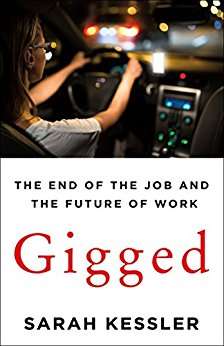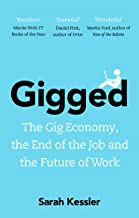Gigged by Sarah Kessler
Uber, Lyft, TaskRabbit – these are only a few of the avenues available for people looking for work in the “gig economy.” Ten years ago, Uber wasn’t even heard of, but now it’s something used as commonly as an iPhone. Gigs are – or at least are advertised as – ways for people to make money on their own time, doing only the jobs that they want to. Sounds great, right? But that doesn’t mean that there aren’t serious drawbacks.
With an increase in gigging over the past few years, it’s made some waves, not only in companies and company policy, but also, on certain occasions, in politics. Just a week or so ago, Uber won a 15-month license to operate in London, England. They had been applying for a 5-year license, but problems with the company among clientele and black-cab drivers stopped any long-term plans there for the company. Now, London has essentially put Uber on probation.
 Sarah Kessler, the deputy editor of Quartz, has spent years researching the gig economy, the ways it’s evolved over the years, and the impact on both companies, and those looking to pick up gigs. In her new book Gigged: The End of the Job and the Future of Work, she lays her research and examines whether or not the gig market actually lives up to the idea that it promises, the reputation it wants to have as the 21st Century job, and more.
Sarah Kessler, the deputy editor of Quartz, has spent years researching the gig economy, the ways it’s evolved over the years, and the impact on both companies, and those looking to pick up gigs. In her new book Gigged: The End of the Job and the Future of Work, she lays her research and examines whether or not the gig market actually lives up to the idea that it promises, the reputation it wants to have as the 21st Century job, and more.
BookTrib got to talk with Kessler about researching the book, the impact of technology on the gig economy, where she sees the future of the job market going, and whether she’s ever picked up a gig herself.
* * * * *
BookTrib: The gig economy is not necessarily new, but it’s certainly evolved over the years. For those who don’t know, can you explain what the modern gig economy is?
Sarah Kessler: People mean different things when they say the “gig economy.” Some people mean only apps like Uber, where a customer presses a button and a worker shows up to do something. Other people are talking about all freelancing, or non-traditional work arrangements.
In my book, I look at how technology can be used to manage work in new ways, and what the consequences of that could be. Uber is really an extreme version of a longstanding trend of hiring people away from traditional jobs. That trend is consequential because outside of these traditional jobs, people have fewer labor protections and benefits. If you’re an “independent contractor,” you have none.
BookTrib: The gig economy has been around for decades, but it seems to have a different prominence and place in our society now. Why do you think people are turning from the traditional job market to gigging?
SK: Some people do it because it is the only work they can find. Some because they want a more flexible work arrangement. Most research on the gig economy suggests that a lot of people are working this way in addition to another job, which may say something about the quality of those other jobs.
In my book, I follow the stories of people who fall in all of these categories.
BookTrib: Technology has made some incredible advances over the past decade. How has this impacted the gigging culture? Do you consider this impact to be a good or a bad thing overall?
SK: It’s never been easier to find a freelancer, or find a temporary worker to fill a shift. It’s never been easier to tell a freelancer how to do a job like cleaning a house, or when to drive a car, without “technically” managing him or her.
At this point, these systems are new and small, but they show potential that is worth considering.
BookTrib: Throughout your research, what have you found are the biggest drawbacks and benefits of the gig economy?
SK: Traditional jobs have their flaws. The idea that we should all work from 9 to 5 in an office was created at a time when you needed to be next to the file cabinet in order to get work done, and the “ideal” family included someone who stayed home full time taking care of the children. That’s not the world we live in, and working “gigs” might be a way to help create a more appropriate job for our current era. The problem is that our social safety net doesn’t work for that type of job, so it transfers all the risks of doing business onto workers.
BookTrib: You bring up how the gig economy has been used as a political tool – can you explain that a bit more to us?
SK: A lot of the solutions that were proposed to help people working in the gig economy—like separating benefits such as health insurance from your job—would help a lot more people than Uber drivers. There has been a general shift of risk from companies to workers. Apps like Uber are an extreme version of this shift, and I think a lot of politicians used it as a way to talk about a much bigger trend.
BookTrib: What was it about the modern gig economy that made you want to research and write about it?
SK: I was interested in what the daily experience was for the people working this way, and how it was different depending on who they were. Work is inherently important to me, and I wanted to understand how technology could change it.
BookTrib: Have you ever gigged?
SK: For a magazine article, I spent a month trying to make the minimum wage using apps like Uber. I failed miserably.
BookTrib: Gigged goes so brilliantly in-depth not only in the explanations of the gig economy, but in the narratives of people who work gigs as well. What was your writing process like for this, putting everything together?
SK: In my day job as I was writing this, I was reporting on the business of the gig economy and the political conversation around it. But telling the story in a narrative, compelling way involved keeping in touch with people who were actually working this way over a period of about three years. I started with eight people who I interviewed regularly, and ended up putting five of their stories in the book.
BookTrib: What advice do you have for people leaving college and going into the job market who are considering taking on gigs on the side?
SK: I would find someone who has done the same sort of work and interview them about what it is like. Ask what expenses surprised them, how difficult it is to find work, and how flexible their schedule actually is—in some cases, work may only be available during certain times, or may pay much more during certain times. You may not be as independent as you think.
BookTrib: Where do you see the future of the job market going?
SK: Apps like Uber still make up a very small percentage of the labor force. But they demonstrate new ways to manage and deploy workers who aren’t direct employees. Since the way we’ve structured things like benefits and labor protections provides a huge incentive for companies to use these other categories of workers wherever possible, I would imagine that they will continue to do so in new ways and in new situations.
Gigged: The End of the Job and the Future of Work is now available for purchase.
Buy this Book!
Amazon




